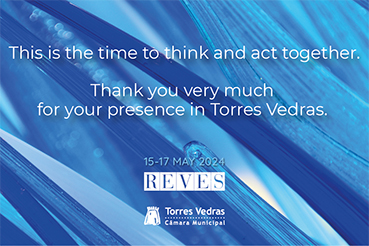The European Network of Cities and Regions for the Social Economy, REVES, held its annual meeting in Torres Vedras (Portugal) from 15-17 May, which included historical visits, debates on the current situation of the Social Economy, and the need for inter-cooperation between the Social Economy and municipalities.
The celebration coincided with the 50th anniversary of the Carnation Revolution in Portugal, a historic mobilisation that led to a new Constitution and the return of democracy, civil liberties and the end of colonialism.
During the three days of the meeting, different visits were made around three main themes: sustainability, the environment and culture and the arts. In addition, meetings were held with enterprises involved in digital innovation and the development of sustainability policies, on which cross-cutting issues such as citizen mobilisation, education and digital innovation driven by the social economy were discussed.
The first evening of the meeting included a tribute to the co-presidents of REVES and a discussion between the president of REVES, Ana Umbelino, the former president of REVES, Felice Scalvini, the secretary general of REVES, Luigi Martignetti, and the director of the Centro Torriense de Estudios de Economía Social and former member of the European Economic and Social Committee, father Vítor Melícias.
Policy Labs to face the challenges of the Social Economy
In the policy lab sessions, participants defined the current challenges in the Social Economy, among which concrete experiences were shared by cities and regions such as Lourinhã (Portugal), Bonares (Spain) and Cascais (Portugal), as well as the region of Västra Götaland (Sweden), or the Intermunicipal Plan for Social Economy of Western Portugal, the Network of Catalan Municipalities for Social Economy and the Region of Catalonia, the Malopolska Region/Cracow Centre for Social Policy (Poland) and Eurometropole Strasbourg (France).
The topics discussed revolved around the possibility of adopting measures for the promotion of the social economy, inter-municipal cooperation, and the interrelation of social economy actors with others to create a favourable ecosystem for the social economy.
The challenges identified were mainly the lack of data on social economy enterprises and organisations and their impact; the lack of recognition of the social economy as a significant partner; and the challenge of bringing together a diversity of actors around the social economy to promote the social, economic and environmental transition of territories.
The conclusions were completed by remarks from Ruben Rebelo of the European Commission, Ricardo Rio of the European Committee of the Regions, and representatives of the Centre for Organisational and Social Studies of the Polytechnic of Porto and the Knowledge Centre/School Nova of Business and Economics, who encouraged the use of the programmes and tools available at European level to promote the resolution of the proposed challenges.
The REVES General Assembly
The General Assembly was the closing event of the meeting and served to re-elect its current president, Ana Umbelino, who is repeating for the second time in her position, as well as to re-appoint a new board of directors.
It also welcomed the new members of REVES, which are the Portuguese city of Cascais and Fondazione ASM (Italy).







